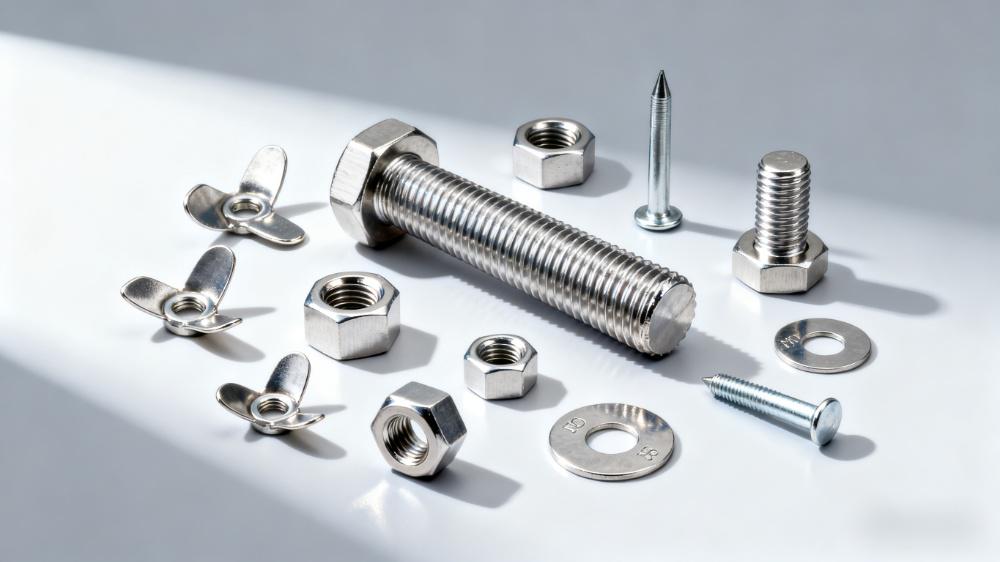In modern manufacturing, cold forged stainless steel fasteners have become a preferred choice for industries that demand strength, precision, and durability. From automotive applications to construction and machinery, cold heading and cold forging technologies enable the production of fasteners with superior mechanical performance and consistent quality.
Let’s explore why cold forged fasteners—especially those made from 18-8 stainless steel—offer unmatched benefits compared to traditional machining methods.

What Is Cold Forging and Cold Heading?
Cold forging, also known as cold heading, is a metal-forming process in which metal is shaped at room temperature without heating. Using high-pressure forming dies, manufacturers can produce complex fastener shapes such as bolts, screws, and wing nuts with exceptional accuracy.
This state-of-the-art production technique not only increases material utilization but also enhances the physical properties of the metal, resulting in higher tensile strength and improved surface finish.
Advantages of Cold Forged Stainless Steel Fasteners
1. Superior Strength and Durability
During the cold forging process, the stainless steel’s grain structure is refined and compressed, improving its strength and fatigue resistance. This makes cold forged stainless steel fasteners ideal for applications that require high load capacity and long-term reliability.
2. Excellent Corrosion Resistance
Fasteners made from 18-8 stainless steel (a common grade containing approximately 18% chromium and 8% nickel) offer outstanding resistance to corrosion and oxidation. This makes them suitable for outdoor environments, marine projects, and applications exposed to moisture or chemicals.
3. Cost-Effective and Material Efficient
Unlike traditional machining, cold heading uses nearly all of the raw material, minimizing waste and reducing production costs. Since the process requires little to no secondary machining, it delivers a more efficient and eco-friendly solution.
4. Precise and Consistent Dimensions
Cold forging produces fasteners with tight dimensional tolerances and a smooth surface finish. Whether you’re manufacturing bolts, screws, or wing nuts, the final products maintain consistent quality across large production runs—critical for high-performance assemblies.
5. State-of-the-Art Production Technology
Modern state-of-the-art cold heading equipment allows manufacturers to produce complex fastener geometries quickly and accurately. Automated systems ensure repeatability, lower defect rates, and reduced lead times—making cold forged fasteners the smart choice for global industrial applications.
Applications of Cold Forged Fasteners
Cold forged stainless steel fasteners are widely used across industries such as:
- Automotive: engine parts, suspension systems, and safety components
- Construction: structural connections, outdoor fixtures, and roofing systems
- Electrical and machinery: housings, brackets, and enclosures
- Marine: corrosion-resistant wing nuts and bolts for harsh saltwater conditions
Their superior mechanical properties and corrosion resistance make them indispensable in demanding environments.
FAQs
1. What is the difference between cold heading and cold forging?
Both terms refer to forming metal without heat. Cold heading focuses on shaping the head of fasteners, while cold forging can involve multiple shaping stages, producing the entire fastener with high precision.
2. Why is 18-8 stainless steel popular for fasteners?
18-8 stainless steel offers excellent corrosion resistance, durability, and strength, making it ideal for most industrial and outdoor applications.
3. Are cold forged fasteners stronger than machined fasteners?
Yes. The cold forging process compresses the metal’s grain structure, improving its mechanical strength and fatigue resistance compared to machined fasteners.
4. Can cold forged fasteners be customized?
Absolutely. Using state-of-the-art forging equipment, manufacturers can produce custom bolts, screws, and wing nuts according to specific design and performance requirements.
5. What industries use cold forged stainless steel fasteners?
These fasteners are widely used in automotive, marine, construction, and machinery industries due to their reliability, strength, and corrosion resistance.
Conclusion
Cold forged stainless steel fasteners combine strength, precision, and corrosion resistance in one cost-effective solution. Through advanced cold heading techniques and state-of-the-art manufacturing processes, fastener manufacturers can deliver durable products that meet the high-performance needs of modern industries.
Whether you’re seeking reliability in 18-8 stainless steel bolts or specialized wing nuts, cold forging technology ensures consistent quality and long-term durability.
